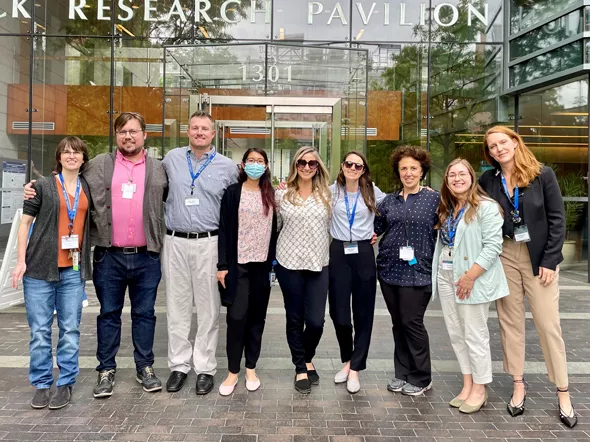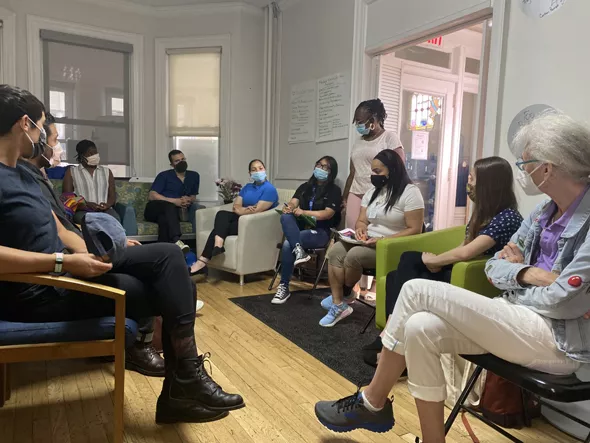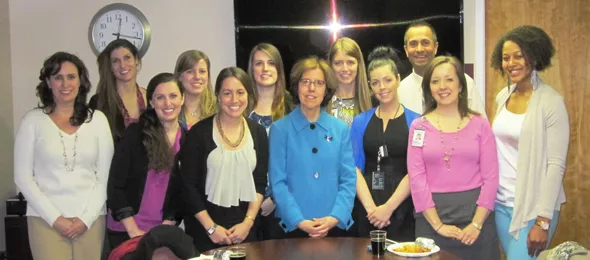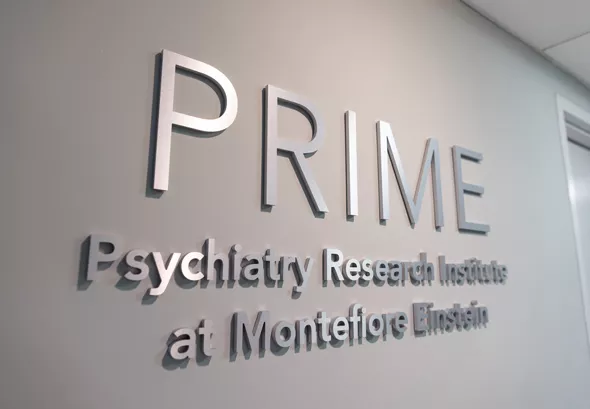As an academic medical center, Montefiore Einstein’s mission is to heal, teach, discover and advance the health of our communities. While our internship deliberately places the heaviest emphasis on clinical service (“to heal”), we intentionally balance this with training and education (“to teach”) and research (“to discover”). Some examples of our commitment to leading and educating include our intense and thorough clinical supervision, a full day of didactics each week (Thursdays), recurring case conferences and a weekly Department of Psychiatry Grand Rounds (from September through June) that features renowned presenters from across the nation. In addition, interns must complete a research project during their internship year. The faculty also frequently invites them to participate in additional scholarly projects, such as papers, contributing chapters to published studies and conference presentations.

Dr. Amanda Zayde, Founding Director of the Connecting and Reflecting Experience (CARE) Program, along with her clinical and research team, at the annual PRIME Research Day.
Supervision
The Psychology Internship Training Program places a heavy emphasis on supervision. On average, interns in all four of our specializations receive between five and seven hours of supervision per week, with three to four individual supervision hours and two to three hours of group or dyadic supervision.
The Psychology Internship Training Program faculty are experts in a range of theoretical approaches (e.g. cognitive behavioral therapy—CBT, dialectical behavior therapy—DBT, psychodynamic psychotherapy, interpersonal psychotherapy, etc.) and modalities (e.g. individual, couples, family systems and group). In addition, interns participate in weekly multidisciplinary treatment teams, take turns presenting an ethical dilemma during our monthly Division of Psychology meeting and attend a monthly “On Becoming a Supervisor” meeting run by our five postdoctoral fellows. Finally, depending on an intern’s rotation and supervisor, supervision may involve the audio recording and/or videotaping of sessions, review of progress notes and being observed and/or engaging in co-therapy.
Didactics
The department uses Thursday as its training and education day. As such, all interns attend lectures from 9:00 am to 10:15 am and from 1:00 pm to 3:00 pm for the duration of the training year. Some of these lectures are conjointly attended by psychiatry residents, fellows and psychology externs. The curriculum, which is presented by members of the faculty as well as other select invitees, is organized around various modules that are directly connected to our goals and objectives, including several lectures on culture and diversity, as well as special topics of importance to new health service psychologists.

Our didactics also involve learning outside the classroom, such as visiting the Project Bravo Food Pantry. This community-based, hospital-driven initiative combats food insecurity for high-risk individuals and families in the Bronx.
In most years, the curriculum includes crisis management, psychopharmacology for psychologists, psychological testing, neuropsychological assessment and learning disabilities. Therapeutic approaches include five full days of training in DBT, CBT, Acceptance and Commitment Therapy, Psychodynamic Therapy, Trauma-Focused Therapy for Children and Motivational Interviewing and Mindfulness. In addition, we provide lectures on the various therapy modalities, including family therapy, couples therapy, marriage/relationship education, group therapy and sex therapy. We also often offer lectures on how to treat specific disorders, including disruptive behavior disorders, substance use disorders, geriatrics and end-of-life issues, sleep disorders and headache and pain.
Finally, we feature a series of lectures that will broaden our interns’ knowledge of the various career possibilities of psychologists in different settings, such as consultation/liaison psychology, family and social medicine, an AIDS Center, integrated primary care, transplant programs and forensic psychology. At the end of the year, interns attend lectures focusing on various professional development issues, including psychology licensure, building a private practice, ethical issues, becoming a supervisor, self-care and burnout and dealing effectively with the media.
Grand Rounds & Case Conferences
Interns must also attend the Department of Psychiatry Grand Rounds series each Thursday from September through June between 10:30 am and 12 pm. This series frequently features distinguished invited speakers from across the nation who present on various timely topics in psychiatry and psychology. Most speakers agree to stay for a private lunch with the trainees immediately following Grand Rounds and occasionally stay after lunch to teach a mini-workshop for the interns in place of the usually scheduled afternoon didactics.

Interns, externs and faculty at a lunch with Dr. Judith Beck after her presentation in the Department of Psychiatry Grand Rounds.
Past distinguished presenters have included:
Linda Carter Sobell
Douglas Woods
Blair Simpson
Barbara Milrod
Lata McGinn
Moira Rynn
David Barlow
Alec Pollard
David Moscovitch
Jonathan Abramowitz
Robert Kohlenberg and Mavis Tsai
Kelly Posner
Fugen Neziroglu
Scott Lilienfeld
Susan Orsillo
Dianne Chambless
Katherine Shear
Rachel Yehuda
Joseph Garner
Adam Radomsky
Kristene Doyle
Douglas Mennin
Martin Franklin
Randy Frost
Nancy McWilliams
Terence Wilson
Martin Antony
Robert Leahy
Barbara Rothbaum
Steven Taylor
Judith Beck
Click Here to View the 2023-24 Grand Rounds Schedule.
In addition to the department-wide Grand Rounds, interns often can attend weekly case conferences and/or multidisciplinary team meetings on each clinical service rotation, allowing them to consult with experts and specialists on current clinical cases. Finally, there is also a quarterly faculty case conference that the interns can attend. This conference presents a complex and challenging case, which is then discussed from multiple clinical perspectives.
Required Research & Other Optional Scholarly Projects
All interns are required to participate in research during the internship year. Many of the faculty at Montefiore Einstein (inside and outside the Department of Psychology) are actively involved in research and willing to supervise psychology interns in their research endeavors.
Outside of the required research, the Psychology Internship Training Program at Montefiore Einstein offers interns a range of scholarly project opportunities. For example, interns may collaborate with faculty on presentations at scientific conferences, be invited to present writing projects (such as book chapters, book reviews and journal articles) or even co-author a book.

The Psychiatry Research Institute at Montefiore Einstein (PRIME) was established in 2017 in collaboration with the Department of Neuroscience to provide an infrastructure for research collaborations.
Finally, in May of 2022, the Department of Psychiatry and Behavioral Sciences held a pandemic-delayed ribbon-cutting ceremony and inaugural PRIME Research Day at the PRIME (Psychiatry Research Institute at Montefiore Einstein) headquarters on the fourth floor of the Van Etten Building on the Einstein Campus. Each year, interns are encouraged to submit a poster for presentation at this now-annual event held in May. In addition, the faculty at PRIME can serve as excellent mentors for interns seeking a path in research and/or academia after completing their internship year.
Click Here for More Information About PRIME’s Center for Health Equity (CHE).
Click Here for a List of Research Mentors & Their Areas of Research/Interest.





